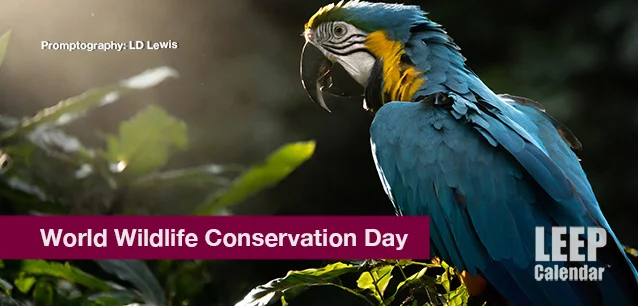 AD
AD
Today is: November 21
Scroll to explore events active on this date.
Additional Events on LEEP
LEEP INK FEATURES

August is Appropos
A toddler playing in the fountain at a park in Santa Fe, New Mexico—Photo LD Lewis. In August, we live through the Dog Days of Summer. It's hot and often humid, and those ...

September is Sassy
Can you hear that sigh of relief from parents worldwide? Yes! September marks the return of students to school, a global phenomenon. Preparations for the ACT and SATs begin earnestly for ...

OOH LA LA, October
October is the busiest month for events, with 5% more happening than in May, the second most eventful month. Sailing enthusiasts will be glued to the finals of this year's Am...
About World Wildlife Conservation Day
United States
Ends: Dec 04, 2024
DESCRIPTION:
World Wildlife Conservation Day, commemorated annually on December 4, serves as a global call to action for preserving Earth's endangered flora and fauna. Established in 2012 by then-US Secretary of State Hillary Clinton, the day aims to heighten awareness about critical issues like wildlife extinction, endangerment, and the illicit trafficking and poaching of animals. A decade since its inception, the day remains a crucial reminder of the ongoing threats to our planet's biodiversity, primarily driven by human activities.
The significance of World Wildlife Conservation Day lies in its mission to address the alarming rate at which species are approaching extinction. According to the IUCN Red List of Threatened Species, over 41,000 species are threatened with extinction, comprising 28 percent of all assessed species, including 27 percent of mammals, 13 percent of birds, 41 percent of amphibians, 37 percent of sharks and rays, 21 percent of reptiles, and 28 percent of crustaceans.
The plight of well-known species, as reported by the World Wildlife Fund (WWF), underscores the urgency of conservation efforts. For instance, the Tapanuli orangutan population has dwindled to less than 800, while only around 3,900 tigers and about 1,890 giant pandas remain. Other species like the Amur leopard, the mountain gorilla, and the black rhino face severe threats, with their numbers critically low.
In the UK, species including the hedgehog, red squirrel, water vole, beaver, Scottish wildcat, hazel dormouse, and the grey long-eared bat are endangered, primarily due to human-induced factors like settlements, infrastructure development, livestock production, and illegal hunting.
World Wildlife Conservation Day emphasizes the irreversible nature of extinction and humans' vital role in contributing to or mitigating this crisis. In her 2012 address, Secretary of State Clinton highlighted the power of individual choices in combating wildlife trafficking and protecting endangered species. She urged individuals to refuse products made from endangered wildlife, speak out against criminal networks involved in wildlife trade, and hold governments accountable for their actions in wildlife protection.
VIDEOS
SUPPORTING DOCUMENTS
Currently, this event does not have supporting documents.
ADDITIONAL IMAGES
Currently, this event does not have supporting images.
Where would you like to go now?
 AD
AD


/footer-logo.svg)
